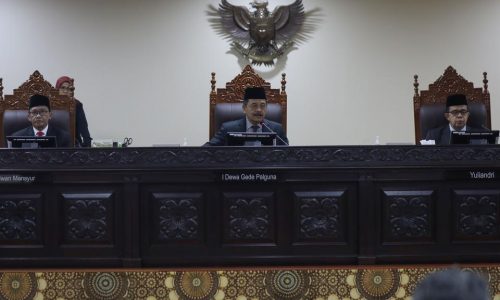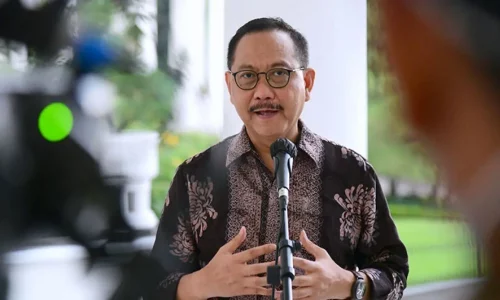Calls are mounted on the three presidential candidates to prioritize maritime security if they lead the nation in view of new threats at the sea that need urgent attention.
Mas Achmad Santosa, the Chief Executive Officer (CEO) of Indonesia Ocean Justice Initiative, emphasized that a robust maritime security system is a fundamental requirement for improvement. He pointed out that Indonesia’s geographical location and fishing potential make it vulnerable.
“We hope this can be input for the presidential candidates,” said Mas Achmad Santosa, during a discussion titled “Detection of Indonesian Maritime Security,” organized by Indonesia Ocean Justice Initiative, on Tuesday, February 6, 2024.
Representatives from all presidential and vice-presidential campaign teams attended the event. Among the attendees were Vice Admiral (ret) Achmad Djamaludin from the National Team of Anies Baswedan-Muhaimin Iskandar, Bobby Rizaldi from the National Campaign Team of Prabowo Subianto-Gibran Rakabuming Raka, and Jaleswari Pramodhawardani from the National Winning Team of Ganjar Pranowo-Mahfud MD.
Foreign research ships
The Indonesia Ocean Justice Initiative detected the entry of unauthorized foreign research ships. Two Chinese ships conducted research throughout the last year, entering Indonesia’s Exclusive Economic Zone (EEZ).
These ships had previously conducted research across the entire South China Sea, passing through Vietnam, the Philippines, Brunei, and briefly entering Indonesia. “The research conducted is massive,” stated the presenter of Indonesia Ocean Justice Initiative’s study, Imam Prakoso.
Oil Spills
The second threat is oil spills in Indonesia, primarily in the western part. Imam mentioned that the Java Sea is the most polluted sea due to fuel spills. Moreover, waters around the Riau Islands are also prone to oil spills.
“Oil spills is rampant because tanker activities in the waters bordering Singapore are very high. It becomes worse due to lack of supervision,” Imam said.
Indonesia Ocean Justice Initiative found a 6.4-kilometer oil spill near Bintan Island from satellite study results.
Illegal Fishing
Fish theft is still a problem that the new president needs to address. “This is because many fishermen from neighboring countries enter, despite the agreed-upon EEZ between the two countries,”
Purse seine nets
According to Indonesia Ocean Justice Initiative’s study, the use of purse seine nets has become prevalent since 2022. In the same year, the number of vessels using these nets increased from about 20 to more than 1,000.
The study found that vessels using these nets often conflict with local fishermen. Local fishermen consider purse seine nets similar to trawls, which have been banned. Therefore, Indonesia Ocean Justice Initiative suggests that the new president temporarily ban the use of this method while researching its security.
Unidentified Vessels/Dark Vessels
The study by Indonesia Ocean Justice Initiative also found indications of former foreign-flagged vessels sailing undetected in Indonesia. They found that these vessels turned off their Automatic Identification System (AIS) and sailed in the Arafura Sea. “These ships were cargo vessels in 2014, and now they have no permits,” said Imam.
Illegal fishing and maritime defense problem
The waters of Indonesia have faced a surge in illegal fishing activities by foreign ships targeting the country’s abundant fishery resources. Authorities from the Ministry of Maritime Affairs and Fisheries have thwarted an attempt by a Filipino-flagged fishing vessel in the waters of the Sulawesi Sea.
According to data from the Ministry of Maritime Affairs and Fisheries, from January to mid-October 2023, the maritime patrol vessels of the ministry have apprehended 15 foreign fishing vessels engaged in illegal fishing within Indonesian waters.
According to a report from the Indonesian House of Representatives Journal, several areas within Indonesian waters are highly susceptible to illegal fishing, including the waters around Natuna, northern Sulawesi, areas around Maluku, and the Arafura Sea.
In 2021, Deputy Speaker of the People’s Consultative Assembly (MPR), Syarief Hasan, highlighted the security challenges in the waters around Natuna, which are frequently entered by vessels from other countries, particularly Vietnam and China.
This issue has become a persistent challenge for Indonesia, and effective solutions are yet to be implemented.
“The sovereignty of the country is jeopardized every year, not to mention the frequent theft of marine resources,” Hasan said.
On the flip side, Hasan stated that the undetected entry of vessels from Vietnam and China indicates that our military technology is lagging behind neighboring countries. This is a lamentable situation.
With vast oceans and abundant marine resources, the outcome is that our resources are pilfered by other nations. The government must not turn a blind eye to this fact, especially considering the recurring nature of such incidents.
According to the Food and Agriculture Organization (FAO), a UN agency dealing with global food and agriculture issues, Indonesia’s potential for marine capture fisheries ranked third globally in 2020, following China and Peru.
Indonesia contributed 8 percent to global production. However, regrettably, the country loses a tremendous income potential every year. The Indonesian Oceans Justice Initiative, for instance, estimates that Indonesia faces losses of around US$ 4 billion (IDR 62.7 trillion) annually due to illegal fishing practices.










